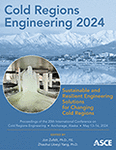Utilizing Machine Learning to Enhance Infrastructure Resilience in Cold Regions
Publication: Cold Regions Engineering 2024: Sustainable and Resilient Engineering Solutions for Changing Cold Regions
ABSTRACT
In the challenging domain of engineering, where cold regions present formidable challenges, we confront the relentless forces of nature. From sub-zero temperatures to the unpredictable dance of snowfall and the silent buildup of ice, these regions demand innovative solutions to fortify the resilience of critical infrastructure. This initiative harnesses the potential of cutting-edge technology and leverages the extensive historical weather data tapestry. It introduces a pioneering strategy by integrating machine learning algorithms with extensive weather data, steering cold region engineering into an era defined by foresight and adaptability. This paper studies a transformative approach designed to forecast, prevent, and ultimately enhance infrastructure resilience in the face of rigid cold. Addressing the distinct challenges of cold region engineering, arising from harsh winter conditions such as extreme cold temperature, snowfall, and ice accumulation, we offer a comprehensive study using machine learning algorithms applied to historical weather data to construct a deeper analysis model capable of highlighting adverse weather effects. This, in turn, covers the way for optimized resource allocation, streamlined maintenance planning, and design enhancements. Our proposed study follows a systematic process, encompassing meticulous data collection, appropriate feature selection, and aiming seamless integration of the model into existing infrastructure management systems. Additionally, it facilitates the implementation of efficient and proactive measures to mitigate the impact of severe weather conditions on infrastructure. The paper also conducts three different hypotheses testing: temperature impact hypothesis, precipitation influence hypothesis, and ice accumulation and infrastructure resilience hypothesis, propelling engineering practices to new heights, particularly in the face of challenging cold environments.
Get full access to this chapter
View all available purchase options and get full access to this chapter.
REFERENCES
Qin, Y., Ding, J., Li, Z., Song, L., and Shen, C. (2020). Deep learning for long-term weather forecasting. Computers & Mathematics with Applications, 79(8), 2208-2220.
Bhowmik, A., Gangopadhyay, P., and Nainis, L. (2015). Bayesian network based statistical approach for ice sheet modeling. Environmental Modelling & Software, 72, 199-210.
Li, W., Li, M., and Ma, X. (2020). Machine learning based vibration analysis for bridge damage detection: A review. Smart and Sustainable Built Environments, 1(1), 34-46.
Cha, Y., Choi, W., and Büyüköztürk, O. (2017). Deep learning-based crack detection using convolutional neural networks for bridge inspection. Computer-Aided Design, 89, 4-18.
Khomsiakova, E., and Polukhin, O. (2019). Application of machine learning methods for predicting the bearing capacity of ice roads. Journal of Physics: Conference Series, 1264(1), 012045.
Gaume, J., Grandjean, G., and Morin, S. (2012). Mapping hazard and risk areas for avalanche events using statistical models and GIS: Application to the French Alps. Natural Hazards, 63 (2-3), 823-851.
Menne, M. J., Durre, I., Vose, R. S., Gleason, B. E., and Houston, T. G., (2012). An overview of the Global Historical Climatology Network-Daily Database, Journal of Atmospheric and Oceanic Technology, 29, 897-910, DOI:.
Meyer, S. (2023). The 13 coldest cities in the U.S. [Online] https://shorturl.at/sBDT5. Last accessed: 2023/12/13.
Raschka, S., (2020). Model Evaluation, Model Selection, and Algorithm Selection in Machine Learning, arXiv: 1811.12808, 2020.
Biau, G., (2012). Analysis of a Random Forests Model, Journal of Machine Learning Research, 13 (2012) 1063-1095.
Information & Authors
Information
Published In
History
Published online: May 9, 2024
ASCE Technical Topics:
- Artificial intelligence and machine learning
- Climates
- Cold region construction
- Cold regions engineering
- Computer programming
- Computing in civil engineering
- Construction engineering
- Engineering fundamentals
- Environmental engineering
- Ice
- Infrastructure
- Infrastructure resilience
- Measurement (by type)
- Meteorology
- Special condition construction
- Temperature effects
- Temperature measurement
- Weather forecasting
Authors
Metrics & Citations
Metrics
Citations
Download citation
If you have the appropriate software installed, you can download article citation data to the citation manager of your choice. Simply select your manager software from the list below and click Download.
